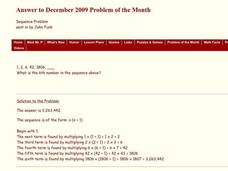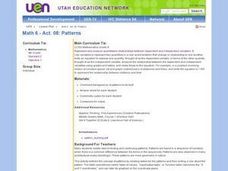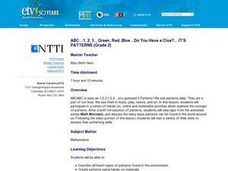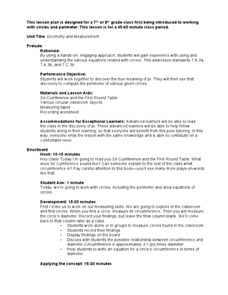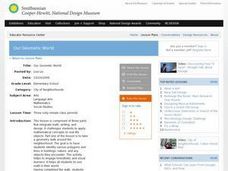Curated OER
Give It a Whirl
Students examine and identify polyhedron shapes on a math website. They write journal reflections about two- and three-dimensional shapes, and transform a square into a pinwheel.
Curated OER
Geometry Jeopardy
Students identify the pattern in a problem. For this geometry lesson, students make predictions, collect and analyze data. They apply the idea of scales and measurements to the real world.
Curated OER
Investigation - Looking For Triangles
Seventh graders investigate a series of triangles, looking for patterns and generalizing what they have found. They analyze the pattern data and organize it into a table and graph. Students identify the relationship and discover the rule...
Curated OER
How Alike Are We?
Fourth graders find the range, mode, median, and mean for each of the data sets (height and shoe size). They discuss which measure of central tendency for each data set best represents the class and why. Students graph the shoe size and...
Curated OER
Geometric Figures
Students identify two and three dimensional shapes and use appropriate geometric vocabulary to write a description of the figure by taking pictures of geometric figures in their own environment.
Curated OER
Exploring Geometric Patterns and Relationships
Sixth graders explore different geographic relationships in like drawing lines, rays, and parallelograms. This lesson could be used for review because it covers more than one concept. The students should have prior knowledge.
Curated OER
Geometric Patterns and Relationships
Fifth graders explore three-dimensional figures. As a class, they discuss the characteristics of various three-dimensional figures. In groups, 5th graders write riddles describing the geometric shape. Partners read each other's...
Curated OER
Sequence Problem
In this geometric sequence worksheet, students answer one geometric sequence problem. Students determine the sixth number in the given geometric sequence.
Curated OER
Math 6 - Act. 08: Patterns
Sixth graders use centimeter cubes to build structures and then compare and contrast the patterns they see.
Curated OER
ABC...1, 2, 3...Green, Red, Blue...Do You Have a Clue?... IT'S PATTERNS
Second graders view clips from the animated series Math Monsters, and discuss the many ways patterns can be found in the world around us. Following the video portion of the lesson, 2nd graders visit a variety of Web sites to assess their...
Curated OER
Using an Old Brush in a New Way
Students use toothbrushes, scissors, tag board paper, pencils, drawing paper, tempera, water color kits, and water. They draw a simple contour shape on tag board and cut it out in one piece. Students identify the positive and negative...
Curated OER
Geometry and Measurement
Learners view a right triangle displayed by the teacher. Students measure legs and the interior angles of the triangle. They look for a pattern or relationship between the legs and angles. Learners use pegboards and string to create more...
Curated OER
ARE YOU A TRIANGULATEER?
Students explore about triangles and their relationship to the worlld around them. They are able to identify triangular shapes in their environment. Students are able to communicate to one another their understanding of triangles outside...
Curated OER
The Luxor Hotel Contract
High schoolers determine the surface area of the Luxor Hotel, using the square feet of the base, volume, and the volume formula. They create a scale model of the triangular/pyramid shaped hotel.
Curated OER
Applied Science - Science and Math Lab
Students investigate topology. In this Applied Science lesson students explore higher, more abstract mathematics using tangles. Students make topologically related shapes.
Noyce Foundation
Double Down
Double the dog ears, double the fun. Five problems provide increasing challenges with non-linear growth. Topics include dog ears, family trees and population data, and geometric patterns.
Curated OER
Try Tessellation
Most middle schoolers probably feel that quilting is at best an activity left to their grandmothers. This lesson uses the Zome modeling system to get them to realize how shapes in quilting are really tessellations and repeating patterns....
Curated OER
Exploring Optical Movement in Art
Students describe, represent and analyze patterns and relationships using shapes. They create simple geometric patterns. They demonstrate increasing technical ability and skill to complete visual arts assignments.
Curated OER
Twists and Turns
Students reflect, rotate, translate, and dilate figures in the Cartesian coordinate plane using grid paper and dot paper. They use transformations (i.e., reflections, translations, rotations, and dilations) to describe geometric patterns...
Curated OER
Our Geometic World
Pupils walk around the neighborhood and identify various polygons and lines in buildings, nature and other objects. They design a building using various geometric patterns, shapes and lines. Students complete a descriptive writing of...
Hawaiʻi State Department of Education
Ostinato
Quarter notes, eighth notes, and rests; it's time to read rhythmic patterns in music. The class plays ostinatos as they practice identifying rhythmic patterns. They then listen to Mannheim Steamroller as they draw geometric patterns that...
Curated OER
A Honey of a Hexagon
Students explore how bees make honey and why the hexagon is the best basic pattern for the honeycomb through the use of a video and hands-on activities with honeycombs and geometric shapes.
Curated OER
ExplorA-Pond:3rd Grade Shapes & Fractions
Learners, using a map, drawing or aerial view of a pond, represent the shape of the pond using simple geometric shapes or fractions of those shapes. They identify the numerator and denominator in each fraction created.
Exploratorium
The Four-Square Quilt
Youngsters recognize that triangles can be combined together to make various shapes. The learning activity provides a series of seven steps that engage children in applying transformations to triangles. Pupils use a quilt template and...









